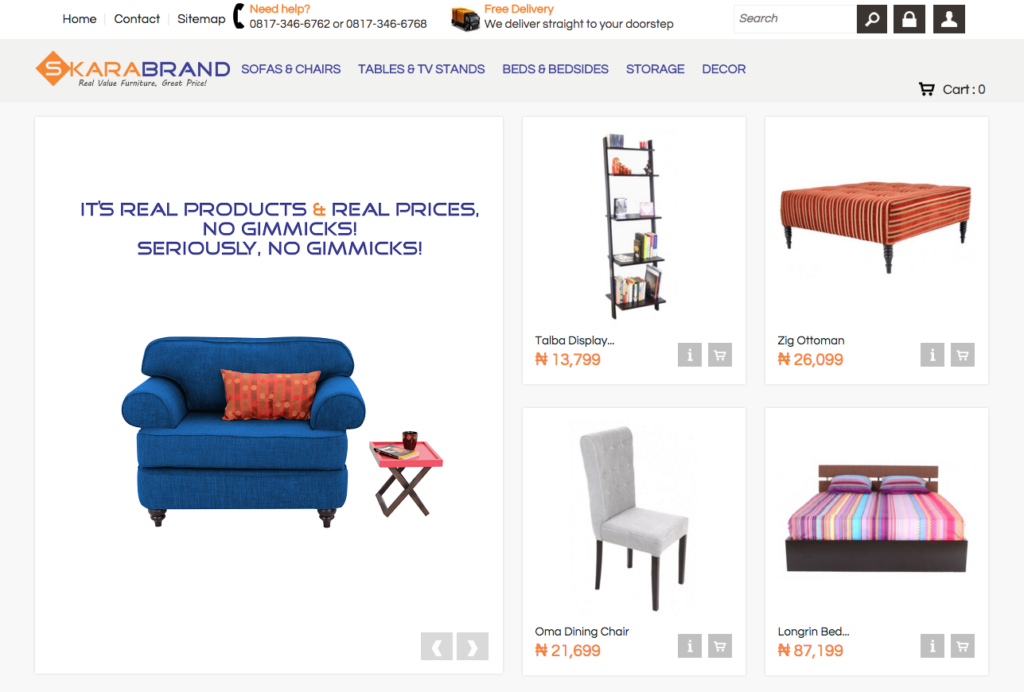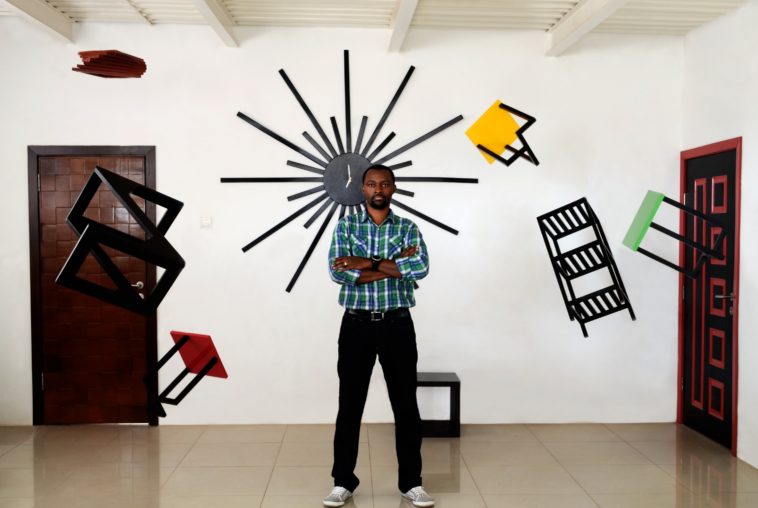Hi Raymond,
We’re really happy to have you on TechInAfrica, to tell us more about your startup Skarabrand and your perspective on the new economy in Nigeria.
First of all, can you pitch us your company in just a few sentences?
Raymond: Skarabrand.com is a curated e-retailer of affordable, contemporary, quality furniture to the Nigerian consumer; solving the problem of how to furnish a home affordably, beautifully & conveniently. Our unfair advantage is that the products we offer are exclusive from our private label, thus able to integrate the entire retail value chain. This translates to cheaper products to the customer & higher profit to shareholders. You can think of us, as aiming to be Nigeria’s (Africa’s) IKEA!

Can you tell us more about yourself, your personal background, your experience and how you went to Skarabrand?
Raymond: My name is Raymond Umeh, the CEO/Founder of Skarabrand. A geologist by profession but I have always been entrepreneurial from childhood. I like to innovate, sometimes I see myself as an inventor. I have over 10 years experience working in the furniture industry, having practically worked in every department from the factory floor to the board room. In 2005 determined to pursue my entrepreneurial dream, I jumped at an opportunity to work in a rundown furniture business. I fell in love with making furniture & ended up taking over management of the business. I succeeded in turning around its fortunes, growing it from less than N10m ($50k) turnover business to almost N100m ($500k), in just 4 years. I am passionate about furniture, hungry for success & never give up!
Skarabrand is actually not my first “startup”. I started a pretty successful sports event company in 2005, an online speed dating venture back in 2010/2011. I have always been starting up something.
Skarabrand started when, having been in the industry for many years, i realized that there were so many Nigerians that wanted quality and affordable furniture, but really had nowhere to turn to. If you want to buy furniture, you basically have 2 options:
– Buy from showrooms, which you first have to make out time to visit, and then what is available is expensive with limited variety because they are restricted by the limited space to display products in the showrooms or
– You patronize a roadside carpenter, whom we at Skarabrand call #onecarpenterlikethat to make furniture for you. Now with these guys, you do not get any guarantees on the quality of raw materials and end up with shoddy products; they lack innovation in product designs and do not offer after sales support or services.
Can you tell us more about Nigeria? Why this market?
Raymond: The furniture industry in Nigeria is a very exciting space with huge potential. It is highly fragmented, grossly undersupplied with no major retail player either offline or, especially online, but with massive potential of over $1 billion.
We built skarabrand.com to provide an online destination where Nigeria’s rapidly growing internet savvy consumer class, currently about 60million, can review, select and buy a wide variety of affordable, quality furniture and home décor items conveniently, while experiencing superb customer service. Key furniture Industry facts:
Size of furniture industry – N250Bn ($1Bn)
Household Furniture – 65% of Industry N163Bn ($650Mn)
Projected sales on Avg. monthly volume N12.5Bn ($50Mn)
Secondly, the number of Nigerians searching for furniture and furniture related items online has steadily increased over the past couple of years. In 2015, it more than doubled to over thirty thousand searches monthly. We believe that the trend is going to continue to grow at this rate as more and more people get comfortable shopping online and the growth of internet penetration.
What are the main issues you have been facing with Skarabrand in Nigeria?
Raymond: Lack of trust – this is a challenge that we are tackling with the presentation of the website: high resolution visuals with multiple views, clear product specifications and pictures of actual products.
– We also have a 100% money back guarantee. This comes into play, if the product delivered does not match what is on the website, which will never happen! We currently have about 90% of our customers as return customers.
– Logistics (delivery) infrastructure: this is difficult and expensive as we not only sell, but perform last-mile deliveries to satisfy our customers. At the moment delivery is achieved with 3rd party delivery companies, though we have plans to establish our own delivery network.
– Funding
Who are your main competitors around?
Raymond:
1. Roadside carpenters (Competition on Price – but inferior quality, no customer service & returns policy)
2. Katako.com.ng, Domestico.com.ng (Competition Online – These are market places and do not own the products they offer, hence)
3. Brick and Mortars (Lifemate, Bedmate, Alibert: Overpriced, limited assortment because of limited showroom space)
What is your point of view, as a startup founder, about Nigeria?
Raymond: Nigeria is very exciting, with a very massive consumer class and a growing ecommerce market with huge potential, with new entrants pretty much every day.
Is it hard to find investors there?
Raymond: It is challenging. Up until recently, Startup investments really did not exist. There were very few, if any, VC firms interested in statups and Angel investors interested in the space, especially when it came to tech startups. However, in the last two years Angel groups have started to form, such as African Business Angels Network (ABAN) Angels, Tony Elumelu Foundation with its TEEP program, and a few others, have started to invest in startups. There are also quite a number of VCs who have invested millions of dollars in startups here in Nigeria with good prospects. Industry analysts say things will only get better as more and more VCs and Angel investors are looking towards emerging markets, Africa in particular.
In our experience for example, we have found that some investors do not understand the startup terrain, let alone our model of ecommerce+manufacturing (just like Warby Parker or Made.com), hence weary of investing. Here, proper enlightenment needs to happen and I think that’s what the likes of ABAN are doing.
What do you think is lacking to Nigeria to develop it more? What are the main barriers?
Raymond:
Funding: The more VC and angel investors come into the space, the better things would be, as they would bring not only funding but expertise, experience, global best practices.
Infrastructure: this has a lot more to do with the government. And the new government has plans to sustain the past governments plans and even surpass it with plans to invest in more tech Hubs and support existing ones. The government is keen to provide jobs for the teaming unemployed youth, and startups like ours, with huge potential to create 1000s of jobs, hope to benefit.
What is your perspective for the next years on Nigeria and more regionally on Africa?
Raymond: Despite the well documented security challenges, the business climate in Nigeria is getting more and more conducive for investment. It is one of the highest recipients of FDI and the largest economy in Africa. Also, with continued political stability, and the commitment of the current government to focus on job creation, entrepreneurship and security, the future will only get better for investors and businesses.
As you know, we are always on the look of great startups, new products and amazing entrepreneurs, could you name a few locally or regionally in Africa?
Raymond: Fashpa, Cowriepay, Yudala
Thanks for your time, and we’ll keep our readers up to date with your startup updates!
More about Skarabrand?
www.skarabrand.com


